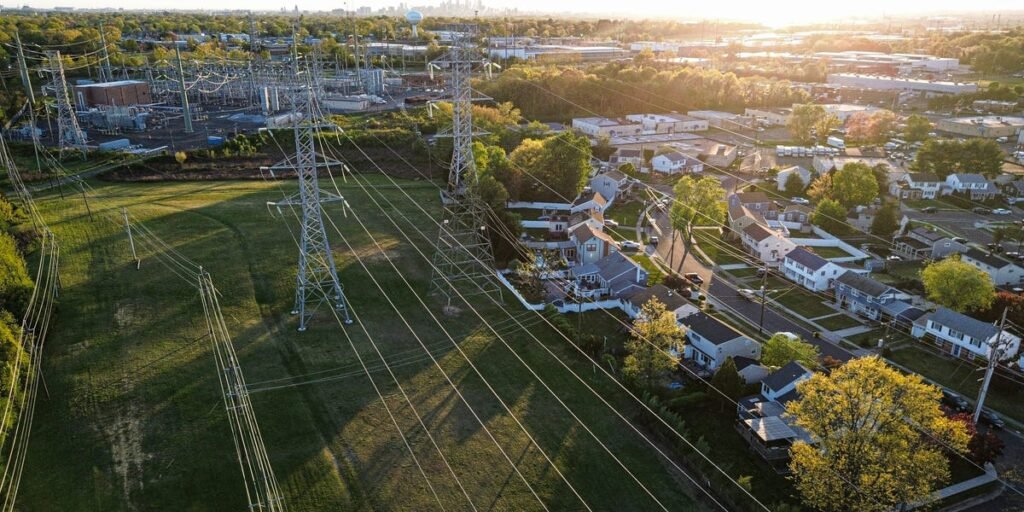- Big Tech’s secretive electricity deals with utilities may raise costs for Americans, Harvard researchers reported.
- Data centers could consume 12% of US electricity by 2028, up from 4% in 2023.
- Researchers call for more scrutiny of contracts to protect consumers from higher bills.
Tech companies racing to secure power for their data centers have struck dozens of secretive electricity deals with utilities that could cost average Americans a “staggering” amount, Harvard research found.
With data center construction on the rise and utility costs top-of-mind for many Americans, the Harvard Electricity Law Initiative reviewed 40 special contracts that state regulators have approved between utilities and data centers. If these contracts offer discounted electricity rates to data centers, and new power grid infrastructure is needed to serve them, other customers may end up paying for the shortfall through higher utility bills.
But it’s nearly impossible to know the exact price tag of any cost shifts because the terms of these special contracts are hidden from public view, the report found. State regulators usually approve utilities’ requests for confidentiality, limiting public scrutiny. That means billion-dollar contracts are getting approved without a transparent accounting of the costs and benefits, researchers said.
“When we have potentially billions of dollars going through these secret contracts where there’s just not a lot of investigation about what’s going on, we think there’s reason to be suspicious that utilities may be offering discounts that are subsidized by everybody else,” said Ari Peskoe, director of The Harvard Electricity Law Initiative and coauthor of the paper with Eliza Martin, a legal fellow.
The report lands as data center construction is booming, in part to serve Big Tech’s artificial intelligence race. Some AI data center complexes need as much power as entire cities and by 2028, the industry could account for 12% of US electricity consumption — up from 4% in 2023, according to federal estimates. The trend is leading some citizens, state policymakers, and at least one utility to try to shield households from rising bills.
Utilities and tech companies have told Business Insider that the contracts they negotiate should cover the costs of any power grid upgrades required to serve data centers. Lucas Fykes, director of energy policy for the Data Center Coalition, which represents companies including Amazon Web Services, Google, Microsoft, and Meta, said in an emailed statement that the industry is committed to paying its full cost of service.
Fykes added that the Harvard research overlooks a finding in Virginia — the world’s largest data center market — that the industry is paying the appropriate costs for its energy use. In December, an independent study commissioned by Virginia’s Joint Legislative Audit and Review Commission found that rates “appropriately allocate costs to the customers responsible for incurring them, including data center customers.”
The report also said that data centers’ increased energy demand will likely increase costs for everyone, including residents and businesses. A large amount of new power plants and transmission lines will be built that otherwise wouldn’t be needed, if not for data centers. A typical residential customer in Virginia could see an extra $14 to $37 each month on their utility bill by 2040. The report said creating a separate category for data centers and changing the way costs are allocated across customers could help insulate households from statewide cost increases.
Peskoe recommended greater scrutiny and regulation of special contracts, as well.
“We didn’t realize how extensive these secret contracts were,” Peskoe said. “The more we dug, the more we kept finding.”
Regulators are required to protect the public from ‘cutthroat’ practices. Researchers are skeptical.
State and federal regulators allow most utilities to spread the cost of power grid upgrades across their customer base. This is typically done through what’s known as a rate case increase, a lengthy and public process at state public utility commissions. Consumer advocates, environmental and industrial groups, and other outside parties regularly intervene.
By contrast, most of the special contracts that Peskoe and Martin reviewed were approved by public utility commissions with “only cursory analysis” and little or no public evidence to back up claims that data center energy costs would be isolated from other customers’ bills. While regulators in many states are required to protect the public from “cutthroat” practices that harm ratepayers, Peskoe said he’s skeptical.
Peskoe said state regulators can face political pressure to approve big economic investments already touted by elected officials for their economic impacts. He added that utilities have a long history of “exploiting their monopolies” to attract competitive lines of business.
Peskoe pointed to an antitrust lawsuit that a small non-profit utility brought against Duke Energy. Court documents revealed that Duke offered Fayetteville, North Carolina, a special contract with a $325 million discount and acknowledged that it would lose $100 million on the deal, but planned to recoup those losses by raising rates on other customers. Duke Energy, which argued its conduct was legitimate price competition and lawful, petitioned the Supreme Court to review the case in February.
Duke declined to comment, and the Edison Electric Institute, a trade group that represents investor-owned utilities, didn’t return a request for comment.
While the case doesn’t involve data centers, Peskoe said it illustrates how utilities compete for big energy customers and can hide how they pass those costs onto other customers.
The Harvard study said states could have stricter rules for special contracts, similar to those in Kentucky, where public utility commissioners only allow utilities to offer discounted rates for five years, and there must be more than enough power supply available on the system. The rate also must exceed the utility’s costs to serve the customer, the study said.
Have a tip or a story to share? Contact this reporter via Signal at cboudreau.37 or via email at cboudreau@businessinsider.com. Use a personal email address and a nonwork device. Here’s our guide to sharing information securely.
